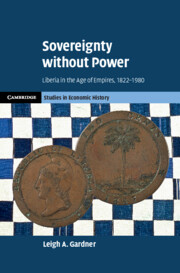Book contents
- Sovereignty without Power
- Cambridge Studies in Economic History
- Sovereignty without Power
- Copyright page
- Dedication
- Contents
- Figures
- Maps
- Tables
- Preface
- Acknowledgments
- 1 Reconstructing the Fragments
- Part I Foundations
- Part II The Art of Survival
- Part III Sovereignty for Sale?
- 8 An African Marshall Plan
- 9 Concessions and Growth
- 10 Selling the Flag
- 11 Sovereignty beyond the Age of Empires
- Book part
- References
- Index
8 - An African Marshall Plan
from Part III - Sovereignty for Sale?
Published online by Cambridge University Press: 27 October 2022
- Sovereignty without Power
- Cambridge Studies in Economic History
- Sovereignty without Power
- Copyright page
- Dedication
- Contents
- Figures
- Maps
- Tables
- Preface
- Acknowledgments
- 1 Reconstructing the Fragments
- Part I Foundations
- Part II The Art of Survival
- Part III Sovereignty for Sale?
- 8 An African Marshall Plan
- 9 Concessions and Growth
- 10 Selling the Flag
- 11 Sovereignty beyond the Age of Empires
- Book part
- References
- Index
Summary
The final three substantive chapters of this book focus on the ways in which the Americo-Liberian elite leveraged Liberia’s sovereignty during the twentieth century to generate rents which helped sustain their rule over the indigenous majority. Chapter 8 examines the flow of foreign aid to Liberia beginning during World War II. During the 1940s, Liberia became one of the leading recipients of American aid, beginning with Lend-Lease in 1942. In scale, its aid was comparable in per capita terms to Asian countries like Korea or Marshall Plan recipients like the United Kingdom. As in other countries, what began as military aid through Lend-Lease to support the development of an airfield and a port to be used by US forces became a larger aid program and an important part of American economic diplomacy after the war. Histories of American policies during this period are generally told from the perspective of the US government. The history of Liberia offers the opportunity to view the rise of foreign aid from the perspective of the recipient country. The chapter shows that while Liberian officials often bristled at American interference, they continued to solicit aid as part of efforts to expand service provision while at the same time restricting political competition.
- Type
- Chapter
- Information
- Sovereignty without PowerLiberia in the Age of Empires, 1822–1980, pp. 191 - 216Publisher: Cambridge University PressPrint publication year: 2022

